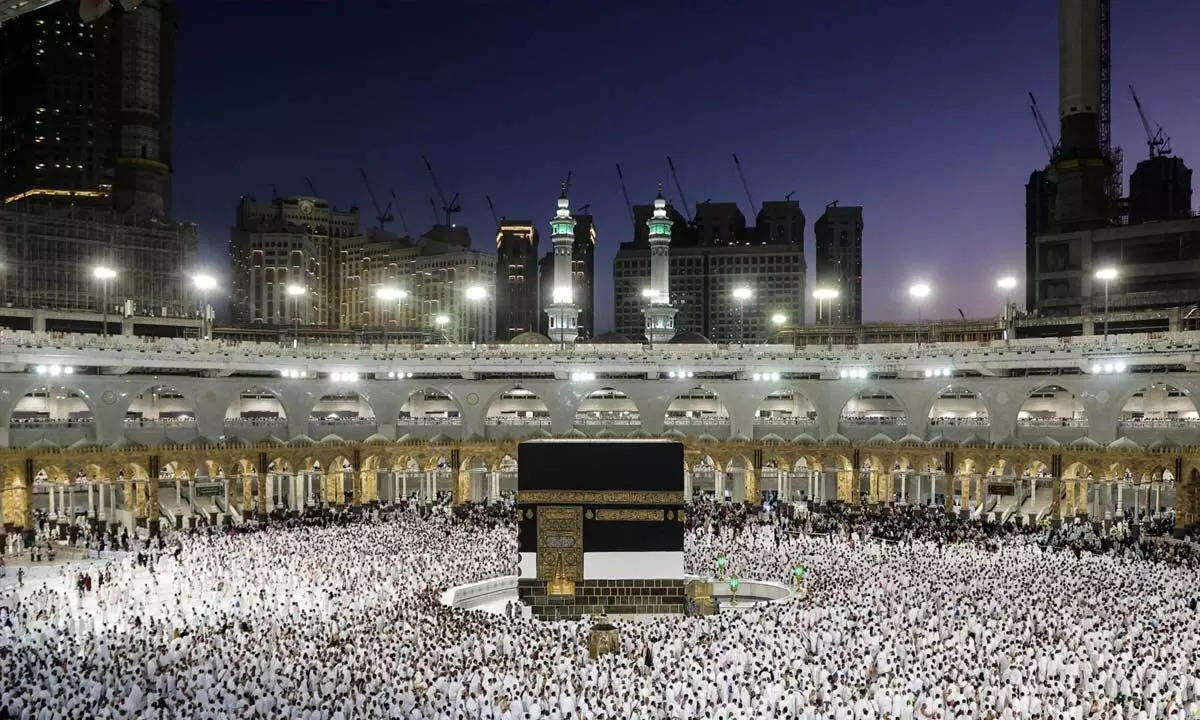Live
- Deepam-2 Scheme Reaches 5 Million Beneficiaries in Three Weeks, says Nadendla Manohar
- Will RG Kar tragedy impact Bengal bypoll results?
- BGT 2024:25: Josh Hazlewood picks four as Australia bundle out India for 150
- BRS rallies support for Lagacharla ‘victims’
- COP29: Scientists, artists, faith leaders call for greater commitment to delivery of climate finance
- Woman donates liver to husband, saves life
- Mechanic Rocky Review: Thrilling Action Film with Twists and Great Performances
- Ponguleti Sudhakar Reddy rubbishes Rahul Gandhi's claims on Modi and Adani
- ‘We can’t take things for granted’: Jayasuriya on balancing formats and Sri Lanka’s path to WTC final
- Prakash Ambedkar ready to 'power' the winner in Maha polls - Mahayuti or MVA
Just In
Hajj 2024: Why is Day of Arafah one of the holiest days in Islam?


The Day of Arafah, falling on the 9th of Dhul Hijjah, is one of the holiest days in Islam.
The Day of Arafah, falling on the 9th of Dhul Hijjah, is one of the holiest days in Islam. This day marks a pivotal moment during the Hajj pilgrimage, where millions of Muslims gather on Mount Arafat, located east of Mecca. This location is historically significant as it is where the Prophet Muhammad (PBUH) delivered his final sermon approximately 14 centuries ago. Despite the intense desert heat, with temperatures often exceeding 40 degrees Celsius, the faithful assemble on this sacred hill.
The Central Day of Hajj
The Day of Arafah is the most crucial day of the Hajj pilgrimage, one of the Five Pillars of Islam. Pilgrims congregate on the plains of Arafat to engage in various acts of worship, including prayer, Quran recitation, supplication, and reflection. This gathering is the pinnacle of the Hajj journey, symbolizing the pilgrims' devotion and submission to Allah.
Spiritual Significance and Practices
The emphasis on forgiveness, mercy, and repentance makes the Day of Arafah particularly significant. It is a day for Muslims to seek closeness to Allah, sincerely repent for their sins, and ask for His forgiveness. The belief that Allah forgives the sins of those who earnestly seek His mercy on this day drives Muslims worldwide to maximize their supplications and spiritual efforts.
Symbol of Unity and Equality
Arafah is also a powerful symbol of the unity and equality of all Muslims. Pilgrims from diverse backgrounds, nationalities, and social statuses come together, dressed in the simple attire of ihram. This gathering underscores the oneness of the Muslim Ummah (community) and highlights the universal brotherhood and sisterhood in Islam. It serves as a reminder of the importance of unity, empathy, and compassion.
Reflection and Renewal
The Day of Arafah offers an opportunity for spiritual cleansing and renewal. Muslims are encouraged to engage in self-reflection, introspection, and repentance. It is a time to seek forgiveness, rectify one's behavior, and commit to positive changes in life. The day is marked by devotion, humility, and a sincere commitment to personal and spiritual growth.
Standing Before Allah
Standing on the Mount of Mercy, where Prophet Muhammad delivered his final sermon, is particularly significant. Pilgrims stand united in a dignified ritual, seeking forgiveness through reflection and prayer. This act is described as "standing before God," symbolizing a profound spiritual encounter.
Fasting on the Day of Arafah
While fasting on the Day of Arafah is prohibited for those performing Hajj, it is a highly recommended practice (Sunnah) for non-pilgrims. The reward for fasting on this day is believed to be the forgiveness of sins for two years.
Transition to Eid-ul-Adha
Following the Day of Arafah, Muslims celebrate Eid-ul-Adha, marking another significant event in Islamic history—the willingness of Prophet Ibrahim (Abraham) to sacrifice his son in obedience to Allah. Eid-ul-Adha, which lasts for three days, is a time of community, charity, sharing meals, and spreading joy.
Observance Dates in 2024
In 2024, the Day of Arafah will be observed on June 15 in countries like Saudi Arabia, UAE, and other Arab and Gulf nations, as well as the USA and UK. In contrast, Muslims in India, Pakistan, Bangladesh, and other South Asian countries will observe it on June 16 due to differences in the crescent moon sighting for Dhul Hijjah.

© 2024 Hyderabad Media House Limited/The Hans India. All rights reserved. Powered by hocalwire.com






